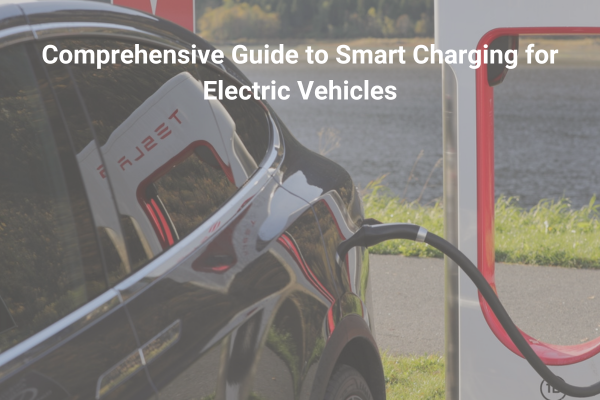Comprehensive Guide to Smart Charging for Electric Vehicles


In this blog, we will explore the future of electric vehicles and discuss what to expect in the coming years.
The current state of electric vehicles (EVs) is marked by significant progress and growing acceptance. In recent years, EVs have gained traction as more consumers recognize their environmental benefits, cost savings, and technological advancements. The global EV market has experienced substantial growth, with increasing sales and a wider range of vehicle models available to consumers.
One of the key drivers of the current state of EVs is the continuous improvement in battery technology. Lithium-ion batteries, which power most EVs, have seen advancements in energy density, allowing for longer driving ranges. This has helped alleviate concerns about range anxiety and made EVs a more viable option for everyday use. Additionally, the declining cost of battery production has contributed to more affordable electric vehicles.
Charging infrastructure has also improved significantly, although there is still room for expansion. Public charging stations are becoming more prevalent, and fast-charging networks are being developed to provide quicker and more convenient charging options. Efforts are also underway to increase the number of charging stations at workplaces, retail centers, and residential areas, further enhancing the accessibility of EV charging.
Government policies and incentives have played a crucial role in promoting EV adoption. Many countries have implemented incentives such as tax credits, rebates, and subsidies to encourage consumers to purchase electric vehicles. Additionally, stricter emission regulations have pushed automakers to invest in electric vehicle technology and expand their EV offerings.
Automakers are responding to the growing demand for EVs by introducing an increasing number of models with diverse options. The market now offers a range of electric cars, SUVs, and even electric commercial vehicles. Major automakers are committing to electric mobility by setting ambitious targets for electric vehicle sales and investing heavily in research and development.
Technological advancements have also improved the performance and features of EVs. Electric vehicles now offer impressive acceleration, smooth and quiet rides, and advanced driver-assistance systems. Connectivity features and infotainment systems are also being integrated into EVs, enhancing the overall driving experience.
The future of electric vehicles (EVs) holds a multitude of exciting developments and advancements that will further propel the growth and acceptance of electric mobility. As technology evolves, we can expect significant improvements in various aspects of EVs, including battery technology, charging infrastructure, vehicle performance, and autonomous capabilities.
One of the most anticipated advancements is the continuous improvement in battery technology. Research and development efforts are focused on increasing energy density, reducing costs, and enhancing battery longevity. Solid-state batteries, which offer higher energy density and faster charging capabilities, are on the horizon and have the potential to revolutionize the EV industry. These batteries can enable longer driving ranges, shorter charging times, and increased overall efficiency, addressing one of the key concerns for consumers.
Charging infrastructure will also see significant advancements. The rapid expansion of charging networks will provide more convenient and accessible charging options for EV owners. High-power charging stations capable of delivering ultra-fast charging speeds will become more widespread, enabling drivers to recharge their vehicles quickly during long trips. Wireless charging technology, where vehicles can be charged simply by parking over charging pads, is also being developed and holds promise for effortless and seamless charging experiences.
Vehicle performance will continue to improve, with advancements in electric motors and drivetrain technology. We can expect enhanced acceleration, higher top speeds, and improved overall handling. As EVs become more mainstream, automakers will invest in designing electric vehicles that cater to various consumer preferences, including sporty and performance-oriented models. Furthermore, advancements in lightweight materials and aerodynamics will contribute to increased energy efficiency and extended driving ranges.
Autonomous driving technology will play a crucial role in shaping the future of electric mobility. EVs are well-suited for autonomous capabilities due to their electric drivetrains and sophisticated onboard systems. As self-driving technology evolves, we can expect to see more electric vehicles equipped with advanced driver-assistance systems and higher levels of autonomy. This will enhance safety and enable new possibilities for shared and automated mobility services.
Another exciting development is the integration of renewable energy sources with EVs. Vehicle-to-Grid (V2G) technology allows EVs to serve as mobile energy storage units, enabling them to store excess renewable energy and feed it back into the grid when needed. This bidirectional energy flow can help stabilize the electrical grid, increase the utilization of renewable energy, and provide an additional source of revenue for EV owners.
In addition to technological advancements, the future of electric vehicles will also be shaped by changing consumer behaviors and preferences. Increasing environmental awareness and concerns about air pollution and climate change will drive more people to embrace electric mobility. Government policies and incentives will continue to support the transition to electric vehicles, with stricter emission regulations and further financial incentives for EV adoption.
As we look ahead to the future of electric vehicles, it is clear that we are on the cusp of a transportation revolution. The advancements and developments discussed here will pave the way for the widespread adoption of electric mobility and redefine the way we think about transportation.
In conclusion, the future of electric vehicles is bright and promising. With ongoing advancements, electric vehicles will continue to revolutionize the transportation industry, offering a cleaner, more efficient, and more sustainable mode of transportation. As we embrace these changes, we have the opportunity to create a greener world for future generations. So, let's embrace the exciting developments ahead and drive towards a future of electric mobility.